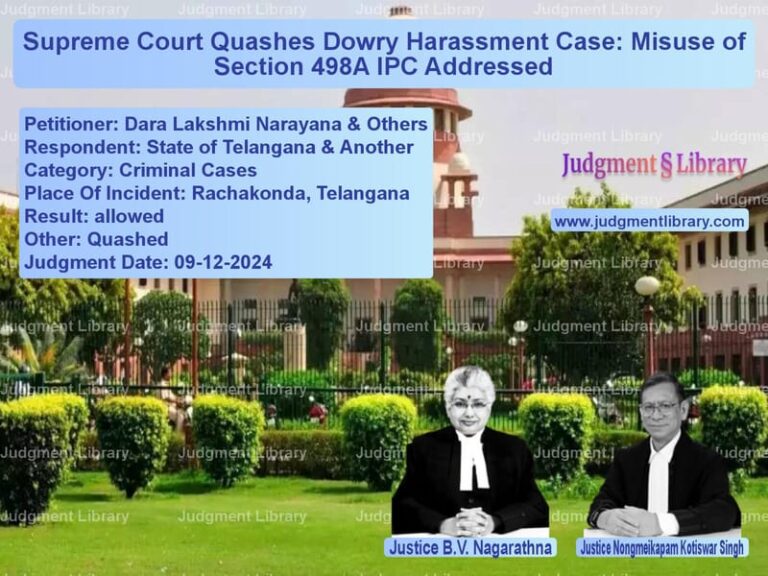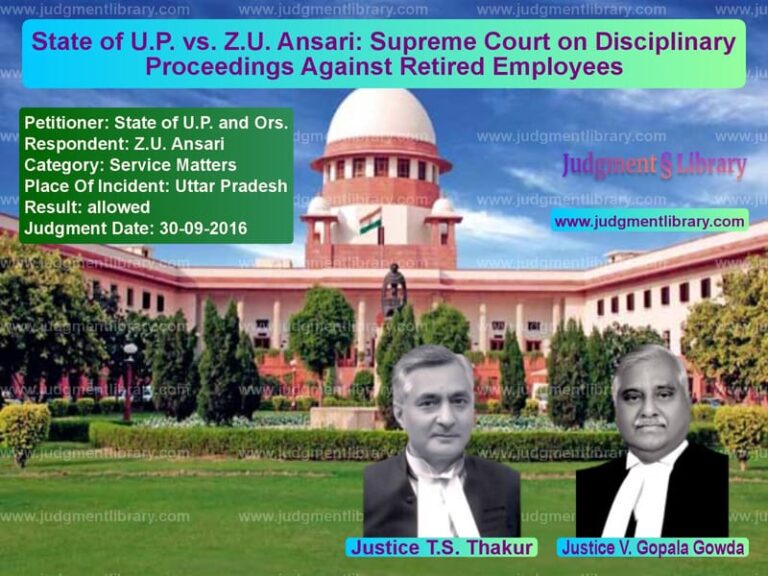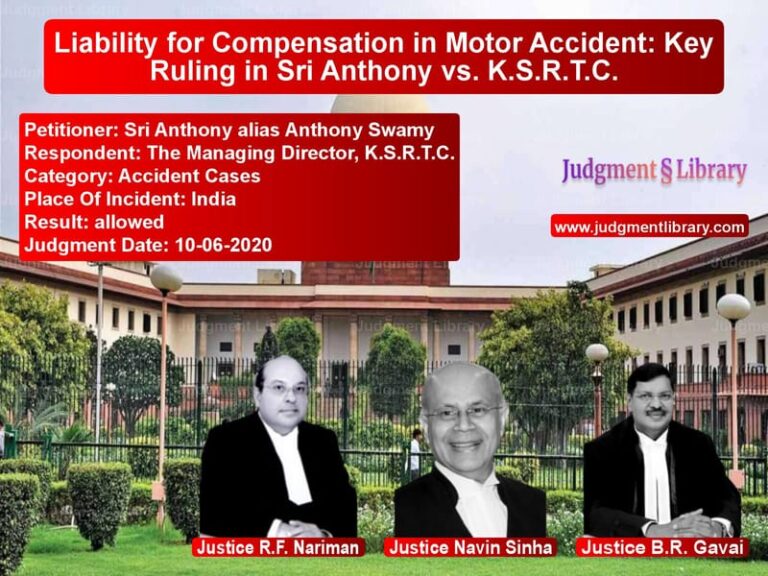Supreme Court Acquits Accused in Karnataka Murder Case Due to Lack of Evidence
The Supreme Court of India, in its judgment dated July 8, 2024, acquitted Vishwanatha in a murder case from Karnataka, overturning the Karnataka High Court’s conviction. The case involved the alleged killing of Devaki, an 86-year-old woman, during a robbery at her home in Kudupu, Mangalore, in 2000. The Court ruled that inconsistencies in witness testimonies, the absence of a proper Test Identification Parade (TIP), and contradictions between forensic evidence and eyewitness accounts created reasonable doubt in the prosecution’s case.
Background of the Case
The prosecution alleged that on December 26, 2000, while Devaki’s family members were away, Vishwanatha and Ravikumar (now deceased) broke into her house intending to rob her. Upon encountering resistance, they allegedly strangled Devaki to death using a cloth. The crime was reportedly witnessed by Rohini (PW-1), Devaki’s daughter, and Rajesh (PW-2), a neighbor.
Following an investigation, the police arrested both accused the same day, and a trial commenced, leading to a complex legal battle across multiple courts.
Trial Court’s Verdict
The Sessions Court acquitted both accused on December 18, 2001, citing:
- Inconsistencies between eyewitness accounts and forensic evidence.
- The absence of a Test Identification Parade (TIP) for Vishwanatha, who was unknown to the witnesses.
- A discrepancy in ligature marks on the victim’s body that did not align with the alleged method of strangulation.
High Court’s Ruling
The Karnataka High Court reversed the acquittal on June 6, 2009, convicting both accused under:
- Section 302 IPC (Murder) – Life Imprisonment
- Section 450 IPC (House Trespass) – Five Years Rigorous Imprisonment
The High Court held that discrepancies in the prosecution’s case were minor and did not affect the overall credibility of the witnesses.
Appeal Before the Supreme Court
Vishwanatha challenged his conviction before the Supreme Court, arguing that:
- The Sessions Court correctly identified contradictions in the prosecution’s case.
- The lack of a TIP meant his identity was never conclusively established.
- The forensic report contradicted the eyewitness accounts of how Devaki was strangled.
- The prosecution failed to explain how he was identified and arrested.
Supreme Court’s Observations
1. Contradictions in Eyewitness Accounts
PW-1 and PW-2 testified that the accused strangled Devaki by pulling a cloth from both ends. However, the forensic report revealed:
- No ligature marks on the back of the neck.
- Ligature marks extending only from one side of the mandible to the other.
- Fractures on the victim’s limbs, inconsistent with manual strangulation.
The Court noted:
“If the victim was strangled in the manner described by the witnesses, the ligature marks should have encircled the neck. The post-mortem findings contradict their statements.”
2. Failure to Conduct a Test Identification Parade
Vishwanatha was unknown to the witnesses, yet no TIP was conducted. The Supreme Court held:
“In cases where the accused is a stranger, conducting a Test Identification Parade is crucial. The absence of a TIP creates reasonable doubt regarding the accused’s identity.”
3. Lack of Clear Identification
The Court found no record of how the police identified Vishwanatha. The investigating officer failed to explain why he arrested this specific individual when multiple people shared the same name in the locality.
4. Timeline Discrepancies
PW-1 claimed to have left her home at 9:30 AM and returned at 12:30 PM, precisely at the moment the crime was occurring. The Supreme Court found this timing implausible.
Final Judgment
- The Supreme Court acquitted Vishwanatha, granting him the benefit of doubt.
- The Karnataka High Court’s conviction was set aside.
- His bail bonds and sureties were discharged.
Key Takeaways
- Eyewitness Testimony Must Align with Forensic Evidence: Contradictions in medical reports and witness statements can weaken a case.
- Importance of Identification Procedures: In cases involving unknown accused, a Test Identification Parade is essential.
- Burden of Proof Lies on the Prosecution: The failure to explain how the accused was identified and arrested contributed to the acquittal.
- Courts Must Scrutinize Convictions Based on Circumstantial Evidence: The Supreme Court reinforced that guilt must be proven beyond reasonable doubt.
Conclusion
The Supreme Court’s decision highlights the necessity of a rigorous judicial process in criminal trials. By overturning a conviction based on inconsistencies, the ruling underscores the principle that an accused cannot be convicted unless guilt is proven beyond doubt.
Petitioner Name: Vishwanatha.Respondent Name: The State of Karnataka.Judgment By: Justice Sudhanshu Dhulia, Justice Prasanna B. Varale.Place Of Incident: Kudupu, Mangalore, Karnataka.Judgment Date: 07-07-2024.
Don’t miss out on the full details! Download the complete judgment in PDF format below and gain valuable insights instantly!
Download Judgment: vishwanatha-vs-the-state-of-karnata-supreme-court-of-india-judgment-dated-07-07-2024.pdf
Directly Download Judgment: Directly download this Judgment
See all petitions in Murder Cases
See all petitions in Bail and Anticipatory Bail
See all petitions in Judgment by Sudhanshu Dhulia
See all petitions in Judgment by Prasanna Bhalachandra Varale
See all petitions in allowed
See all petitions in Quashed
See all petitions in supreme court of India judgments July 2024
See all petitions in 2024 judgments
See all posts in Criminal Cases Category
See all allowed petitions in Criminal Cases Category
See all Dismissed petitions in Criminal Cases Category
See all partially allowed petitions in Criminal Cases Category







